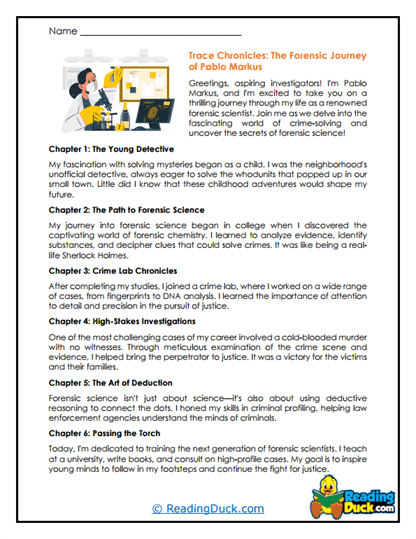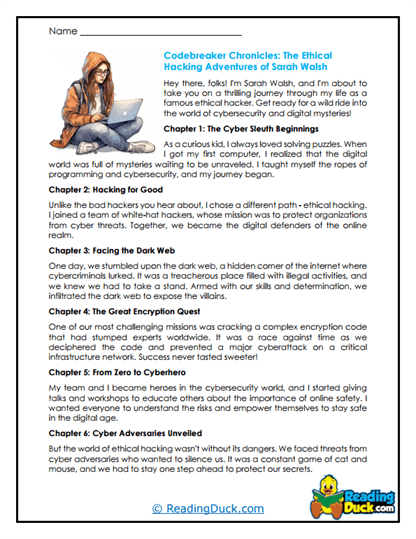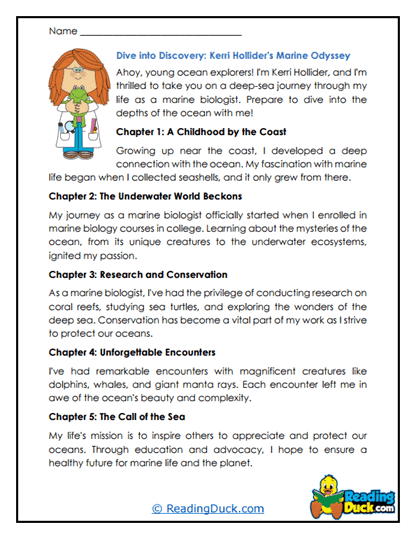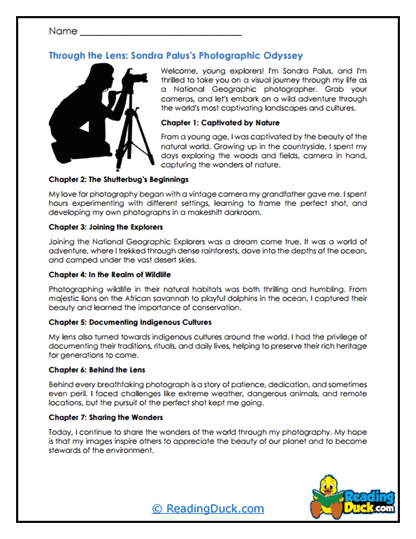Autobiography Worksheets
About Our Autobiography Worksheets
Our Autobiography Worksheets are part of an essential collection within the Nonfiction genre, designed to enhance students’ understanding of personal narratives and self-reflection through the lens of real-life experiences. Each worksheet set includes a carefully selected reading passage that aligns with the autobiography genre, accompanied by a series of multiple-choice questions, short-answer responses, and open-ended essay prompts. These tasks encourage students to delve deeper into the lives and thoughts of individuals who share their personal stories. With easy-to-download and print PDF format worksheets and a downloadable answer key for quick and effective grading, teachers have a seamless resource to incorporate into their lesson plans.
These worksheets are ideal for sharpening critical reading, writing, and thinking skills. Through autobiography, students are introduced to a blend of personal experiences, cultural insights, and historical context, providing a rich backdrop for developing both academic and life skills.
Unpacking the Autobiography Genre
Autobiographies provide an intimate view of an individual's life, as told by the person themselves. In this nonfiction genre, writers recount key events and personal experiences that have shaped their identity, offering readers a first-person perspective on historical moments, social issues, and personal growth. Central to autobiographical writing is self-reflection and personal insight, allowing authors to convey not just what happened in their lives, but why these moments were significant.
Key themes in autobiographies often include:
- Identity and self-discovery: Writers explore who they are and how they’ve evolved over time.
- Overcoming adversity: Many autobiographies delve into challenges the author has faced and the lessons they learned.
- Cultural and historical insights: These texts often provide a unique lens into specific time periods, events, and cultural contexts.
- Inspiration and motivation: Readers frequently draw lessons of resilience and inspiration from the author’s journey.
Studying autobiographies allows students to see how personal experiences intersect with larger societal and historical forces. It helps them understand the human element behind world events and provides relatable examples of growth, perseverance, and self-awareness. The genre encourages students to think critically about their own lives and experiences, enhancing their emotional intelligence and social awareness. Through our worksheets, students are not only guided in reading comprehension but are also prompted to reflect on the significance of personal storytelling, making meaningful connections between the author's life and their own.
How Autobiography Worksheets Foster Skill Development
The Autobiography Worksheets are crafted to develop a range of critical skills, focusing specifically on those most relevant to understanding personal narratives. By engaging with this genre, students strengthen abilities such as:
- Narrative analysis: Students learn to identify key moments in an individual’s life and analyze how these experiences shape the author’s identity.
- Empathy and perspective-taking: Autobiographies encourage students to consider events from another person’s point of view, fostering empathy and a deeper understanding of diverse perspectives.
- Creative expression: Through open-ended questions and essay prompts, students are often encouraged to reflect on their own lives, drawing parallels between their experiences and the autobiography they have read.
In contrast to the Argumentative Worksheets, which emphasize reasoning and persuasive writing, or the Biography Worksheets, which highlight research and fact-based narratives, the Autobiography Worksheets focus on personal storytelling and self-reflection. This genre requires students to think about how individuals choose to frame their lives and what they choose to emphasize or leave out. These exercises foster not only critical thinking but also self-expression, providing students with a way to explore their own narratives through writing.
Expanding Vocabulary in the Context of Autobiography
Building a genre-specific vocabulary is key to mastering nonfiction texts, and our Autobiography Worksheets are no exception. By immersing students in first-person accounts, these worksheets help them acquire terms and phrases specific to personal narratives. Students learn the importance of understanding and using words that relate to self-reflection, life events, and emotional expression, enriching their ability to engage deeply with the text.
Some vocabulary commonly encountered in autobiographies includes:
- Retrospective: Looking back on past events with reflection.
- Memoir: A subgenre of autobiography that focuses on specific moments or themes in the author’s life.
- Introspection: The process of examining one’s thoughts and feelings.
- Resilience: The capacity to recover quickly from difficulties or challenges.
These terms, along with others, are critical for students to develop reading fluency and comprehension. Autobiographies, with their reflective tone and focus on life lessons, often contain nuanced language that requires careful reading and analysis. By incorporating targeted vocabulary-building exercises into the worksheets, students gain the tools they need to grasp complex ideas and articulate their thoughts more effectively.
The worksheets also emphasize the contextual use of vocabulary, where students encounter new terms directly within the reading passages. This method allows for contextual learning, where the meaning of new words is derived from the text, making it easier for students to retain and apply these words in their own writing and discussions.
Connecting Autobiography to Broader Curricula
One of the strengths of the Autobiography Worksheets is their ability to foster cross-curricular connections. Autobiographies naturally bridge multiple academic subjects, making them a versatile teaching tool across different disciplines.
For instance:
- History: Many autobiographies recount key historical events, providing a personal lens through which students can better understand the social and political climate of a specific time period.
- Social Studies: Autobiographies often explore themes of culture, identity, and social change, making them an ideal resource for discussions on societal impact and individual contribution.
- Literature: The personal narrative format allows for comparisons with fiction, poetry, and other literary forms, enriching students' understanding of literary devices like voice, tone, and perspective.
This genre also offers opportunities for students to connect with science through autobiographies of renowned scientists who reflect on their discoveries and challenges, or with civics when exploring the lives of political figures who have influenced public policy. By making these connections, students develop a more well-rounded understanding of how nonfiction texts apply to various fields, preparing them for broader academic success.
Enhancing Reading Comprehension with Autobiography Worksheets
A core goal of our Autobiography Worksheets is to bolster reading comprehension strategies. Autobiographies often present complex narratives with shifting timelines, reflective commentary, and emotional depth, all of which require students to engage closely with the text to fully understand the author’s intentions.
Our worksheets are designed with multiple layers of comprehension in mind, including:
- Multiple-choice questions: These questions test students on key details, themes, and vocabulary, ensuring they have a strong grasp of the text's surface-level meaning.
- Short-answer questions: These require students to synthesize information and demonstrate their understanding of specific parts of the narrative, such as the author's motivations or turning points in the text.
- Open-ended questions: These prompts encourage students to reflect critically on the broader themes of the autobiography, connecting the text to their own experiences or societal issues.
Through these structured exercises, students learn how to:
- Analyze narrative structure: Understanding how authors organize their life stories helps students identify important shifts in the narrative and make sense of non-linear timelines.
- Evaluate key themes: Students learn to recognize recurring motifs or themes, such as resilience, identity, or self-growth, which are central to many autobiographical texts.
- Draw conclusions: By analyzing the author's reflections on their life, students gain the ability to interpret deeper meanings and apply those insights to their own understanding of the world.
These comprehension strategies are crucial for preparing students to critically engage with nonfiction texts beyond the classroom, helping them evaluate real-world information and develop informed opinions.
Conclusion
Our Autobiography Worksheets are a dynamic and essential resource for any nonfiction-focused curriculum. By engaging with personal narratives, students not only improve their reading comprehension and critical thinking skills but also develop empathy, self-reflection, and a deeper understanding of historical and cultural contexts. Through targeted vocabulary building, skill development, and cross-curricular connections, these worksheets offer a comprehensive approach to nonfiction learning.









